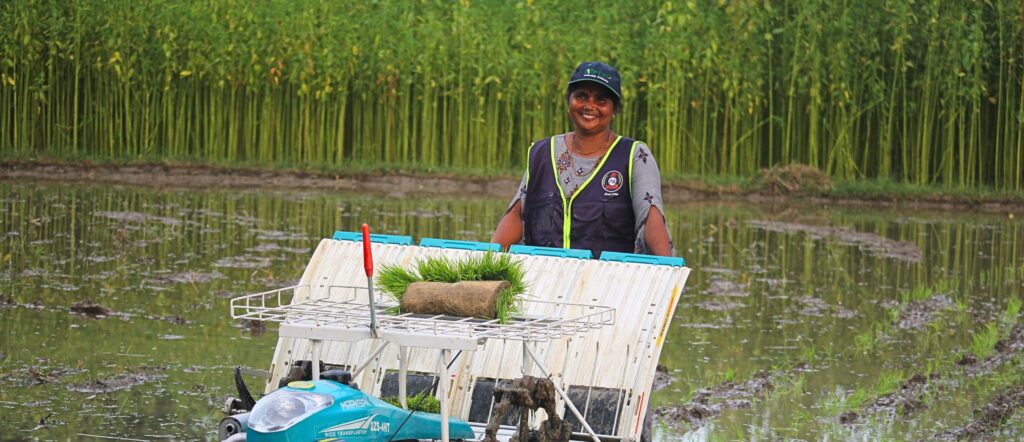

Promila Rani Mondol, 33, lives in Baliakandi district, Bangladesh with her husband, four daughters, and mother-in-law. Farming is her family’s primary livelihood. Promila is a successful Machinery Solutions Provider (MSP) under the United States Agency for International Development (USAID)-funded Feed the Future South Asia Crops Systems Initiative – Mechanization Extension Activity (CSISA-MEA). She and her husband are the primary breadwinners for the family.
In Rajbari district, about 100 miles from Dhaka, the capital of Bangladesh, agriculture is the community’s main source of livelihood. Farmers grow crops over three different seasons, focusing on crops such as rice, wheat, corn, jute, mustard, spices, and vegetables. In 2014, Promila’s family had only two acres of arable land and her husband was the sole breadwinner. With an average monthly income of US$91, it was difficult to meet daily expenses. To increase her family’s income, she began helping her husband in his crop production activities by planting jute, corn, wheat, mustard, and spice seeds.
In 2014, the family became involved in the CSISA-MI project. Initially, they owned a power tiller. The project helped them purchase a power tiller operated seeder for cultivating the land and row sowing. In 2018, Promila was trained in row sowing techniques including seed preparation using a power tiller operated seeder (PTOS) with a starter kit. She started row sowing rabi crops like wheat, mung bean, sesame and mustard. During the kharhu season, she was engaged in row sowing of jute.
After the launch of CSISA-MEA in 2019, Promila participated in several activities including hands-on training in rice planter operation, demonstration of one-acre mechanized rice planter by CSISA-MEA for service business expansion, seedling training, two-day training on agricultural machinery operation, maintenance and troubleshooting, and two field trips on rice planter service business model. With the support of CSISA-MEA, she organized several meetings connecting mat seedlings (seedlings grown in special mats or seedling trays), entrepreneurs, farmers and MSPs, which led to expanding her business prospects. In addition, CSISA-MEA connected her with the Agriculture Extension Department where she procured 1,750 seedling trays for mat seedling growth and 750 kg of seed support, significantly boosting her business growth.
In 2023, Promila purchased a rice transplanter with a 50% government subsidy before the Aman season (mid-July to mid-November/December). CSISA-MEA helped her obtain the government subsidy and introduced her to the VPKA Foundation, which provided a low-interest loan of 4% and a flexible repayment plan.
Promila Rani Mondol uses a rice transplanter to plant rice in a paddy field in Rajbari, Bangladesh. (Photo: Asmaul Hasna/CIMMYT)
During the Aman season, she provided rice transplanting services on 20 hectares of land benefiting around 150 farmers. Her total income during that season was US$ 1,640. Further, in 2023, she earned around US$ 1,047 from row sowing of rice and jute, row sowing of wheat, sesame and mustard through PTOS during the Rabi season. She provides seedling and mechanical rice transplanting services through her network of farmers across three blocks of Shalmala, Baliakandi and Nobabpur in Rajbari district.
What sets her apart is not only her success as an MSP, but her focus on breaking gender norms and inspiring other women in her community. Today, with an annual income of US$2,276 and a profit margin of US$1,184, she has become a leader in her community, encouraging 15 other women to enter agriculture and nursery services.
“Just one day of cultivation and sowing services is enough to cover one month’s tuition fees for my daughter. CSISA-MEA’s support has made me more independent as an MSP and more confident in providing for my family’s finances,” says Promila.
Currently, 15 women from her community are providing farming and sowing services. Other women like Sunita Rani, Niva Rai, Lakoli, Dipti, Mita and Angoori are also inspired by her. Seven women are now able to operate rice transplanters in the rice fields and other women have also shown interest in using them. This is a significant and positive change in the community that Promila has started.
Her impact extends beyond her own success: she has brought about a positive change in her community’s perception of women in agriculture. As vice-chair of the MSP Networking Committee in Rajbari district, she continues to shoulder her responsibilities, contributing not only to the well-being of her family but also to the larger story of women empowerment in Bangladesh.
Tara Thomas Agency stands at the forefront of the entertainment industry, with years of experience dedicated to nurturing the most exceptional talents and successful acts.